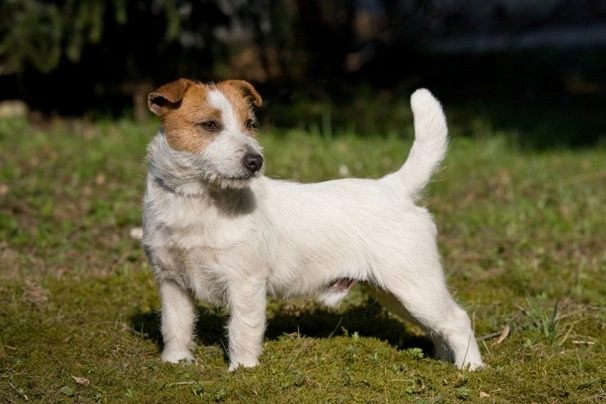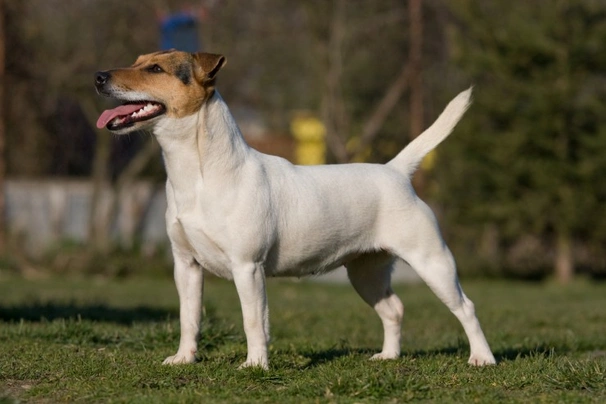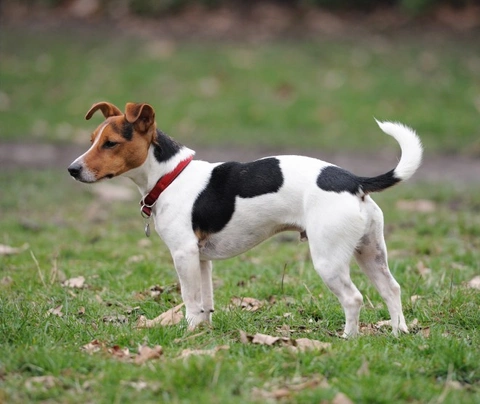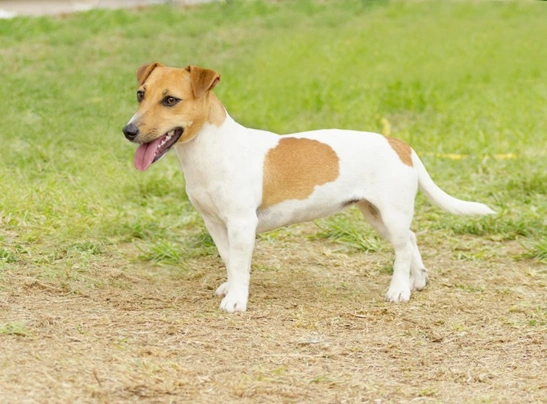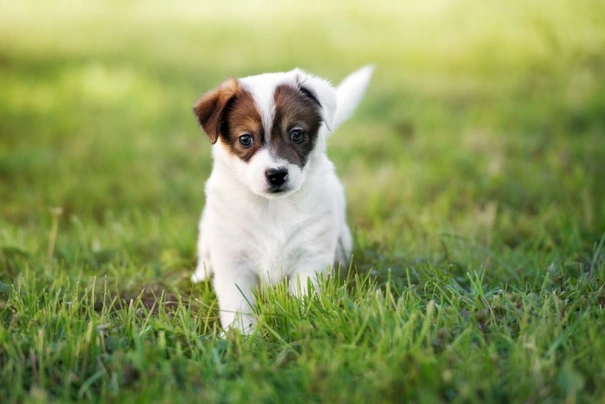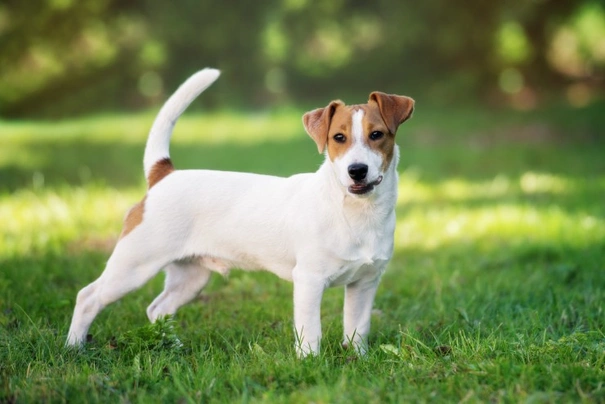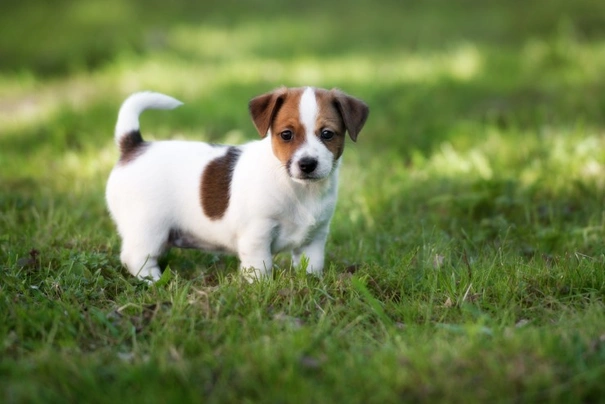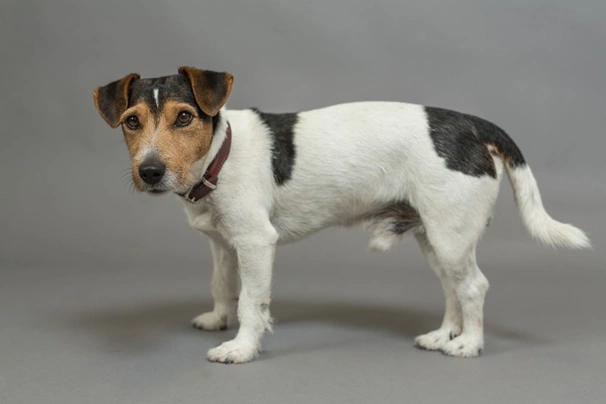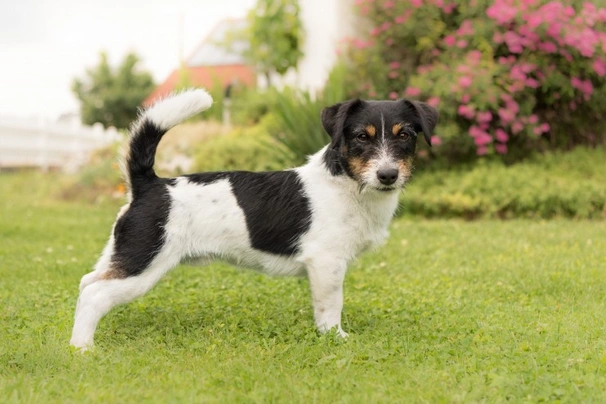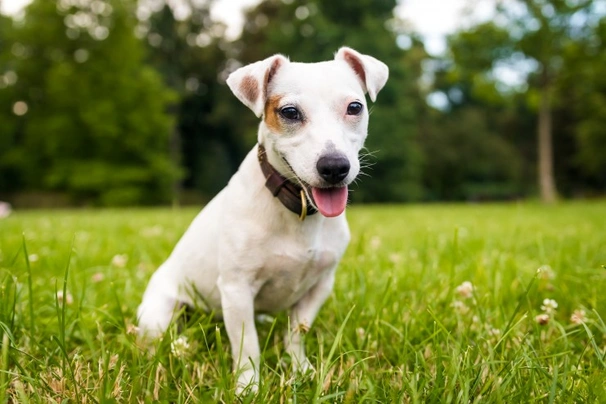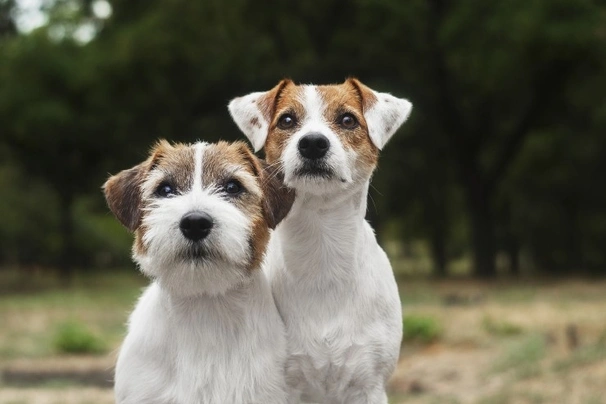Jack Russell
Pros
Cons
Introduction of the Jack Russell
The Jack Russell is one of the most popular companion dogs and family pets in the UK as well as elsewhere in the world and for good reason. They are bold happy and high energy dogs that thrive on being around people. However because they have such a lot of energy they need the right amount of exercise and mental stimulation for them to be truly happy well-behaved dogs.
Although the Jack Russel does make a great family pet they need to be kept in the right sort of environment and one where they never find themselves on their own for any length of time. As such they are better suited to households where people work from home or where one person stays at home so a Jack Russell Terrier always has company around to avoid a dog from being destructive around the home.
History of the Jack Russell
The Jack Russell was developed in Australia although the breed's origins are firmly based in the UK where they have always been highly regarded working terriers since 1800s. These hardworking energetic terriers were taken to Australia by their owners when they emigrated down under and their job was to keep vermin numbers under control on their farms and homesteads.
As previously mentioned Jack Russell Terriers are native to the UK and they first appeared on the scene back in the early 1800's when they were bred by the Reverend John Russell who was a keen hunting enthusiast. He used one specific white coated Fox Terrier in his breeding programme and through careful selection and breeding a distinct breed in its own right emerged. The reverend’s goal was to produce an instantly recognisable terrier and one that boasted enough stamina and courage to cope with the more challenging terrains and conditions that dogs were often asked to work on at the time. The Reverend also wanted a dog that would readily “go to ground” after their quarry without kill they prey.
After the death of Reverend Russell a group of enthusiasts carried on his work wanting to breed small terriers under 6.5 kg in weight. Breed numbers declined during the Second World War after which time these charming feisty little dogs became more popular as pets rather than as working dogs. It's thought the dogs we see today are descendants of the terriers created and developed by the Reverend during the 1800's although Jack Russell Terriers bred in Australia are quite different in appearance. It would be fair to say that Jack Russells bred in the UK are much truer to the original breed.
It is worth mentioning that during the 1960s and 70s a lot of working terriers including Jack Russells were taken to Australia. In 1972 the Jack Russel Terrier Club was founded over there. The breed was to become extremely popular in the show ring in Australia although as previously touched upon dogs bred in Australia were beginning to have a look of their own rather than the terriers seen in UK. Pretty soon the breed was a popular sight in show rings all over the world with the breed being recognised in 1991 by the Fédération Cynologique Internationale (FCI).
The Jack Russell was only recognised by the Kennel Club in 2016 when a breed standard was established that incorporated both Australian and FCI standards too. Today the Kennel Club welcomes owners to register a Jack Russell with the club to improve the gene pool and to increase the number of these charming dogs that take part in Kennel Club shows.
Interesting facts about the breed
- Is the Jack Russell a vulnerable breed? No they among the most popular dogs in the world and ranked 11th most popular in the UK.
- The Jack Russell was named after a Reverend who first created the breed
- The Jack Russell first appeared in the UK during the 1800s but the breed was further developed in Australia
- The Jack Russell is closely related to the Parson Terrier and the Russell Terrier
- They are prone to sunburn so care should be taken during the hotter summer months
- The Jack Russell excels at all sorts of canine sports which includes agility
- They are highly skilled hunters
- Tail docking is no longer allowed in the UK and there are heavy fines involved if a JRT’s tail has been docked
Appearance of the Jack Russell
Height at the withers: Males 25 - 30 cm Females 25 - 30 cm
Average weight: Males 6.4 - 8.2 kg Females 6.4 - 8.2 kg
Jack Russell Terriers are often described as being "small and perfectly put together" which is understandable being that these little terriers are so well proportioned and nicely balanced. Their skulls are quite flat and moderately wide being narrower around a dog's eyes before tapering to the muzzle. They have well-defined stops along with nicely muscled cheeks. Their noses are black and their lips are tight and black in colour too.
They have almond shaped eyes that are quite small and dark in colour with Jack Russells always having a keen alert expression in them. A dog can either have button or dropped ears which they carry close to their heads. They have a strong jaw with a perfect scissor bite where their upper teeth neatly overlap their lower ones. Necks are clean and strong being sufficiently long for dogs to carry their heads proudly.
Their shoulders are well laid back and dogs have nicely pronounced forechests. Front legs are powerful showing a good amount of bone. They have compact powerful and sturdy bodies and level backs which dip slightly at the loins. Chests are quite deep and wide with dogs have nice oval shaped ribcages and a moderate amount of tuck up to their bellies. Hindquarters are muscular and strong with dogs having powerful well-muscled back legs. Their feet are round to oval shaped and quite small with moderately arched toes and firm strong pads. Their tails are set high being thicker at the base and which dogs carry upright when alert but dropped when at rest.
When it comes to their coat the Jack Russell can either be rough or smooth coated with both types having a softer undercoat. The accepted breed colours are as follows:
- White with Black Markings
- White with Black/Tan Markings
- White with Tan Markings
Under the KC standard white must be the predominant colour in a dog's coat.
Gait/movement
Jack Russell Terriers are busy terriers and when they move they do so freely covering a lot of ground when they do. Their movements should never be exaggerated but nicely coordinated with a free-moving straight action both in their front and back legs with dogs having lots of drive in their hindquarters.
Faults
The Kennel Club frowns on any departures from the breed standard and would class its seriousness on how exaggerated a trait might be more especially if it interferes with a dog's ability to work and affects their overall health and wellbeing.
Male Jack Russell Terriers must have both testicles fully descended in their scrotums. It is also worth noting that the size stated in their breed standard is a guide only and that a Jack Russell might be slightly bigger or smaller as well as being a little lighter or heavier than stated in the KC breed standard.
It is worth noting that when shown Jack Russell Terriers are categorised in two groups which are as follows:
- 10" to 12"
- Over 12" and up to 15"
It is also worth noting that any scars on a Jack Russell that are a result from them working or having been in an accident would not be looked down on by judges in the showring unless the injury interferes with a dog's movement.
More about tail docking in the JRT
A law was passed in the UK banning the docking of tails. In England the law came into effect on 6th June 2007. In Wales the law came into effect on 28th March 2007. In Scotland a total ban came into effect on 30th April 2007.
There are exemptions to the ban which covers certain breeds of working dogs and any dog that undergoes any sort of medical treatment.
It is also worth noting that any JRT or other breed where a tail has been docked after the ban came into effect cannot be exhibited at any "paying shows" if the procedure was carried out after the law came into effect. With this said a dog with a docked tail may take part in a show or event where they display their abilities as a working breed.
Jack Russell puppies (and other specific working breeds which includes spaniels and hunt point and retrieve as well as any crosses of these breeds) can have their tails docked providing evidence can be supplied to a vet that the dog would be used as a "working" dog and all relevant documentation to support this must be provided.
It is also worth noting that the law is slightly different in England than it is in Wales.
You can read further detailed information in our articleentitled "Canine Tail Docking - The Law in the UK".
Temperament of the Jack Russell
Jack Russell Terriers are lively feisty keen and always ready to take off after their prey. With this said they can be quite destructive if they are not handled and correctly trained from a young enough age. New owners who are not familiar with the breed and their specific needs are advised to seek help from a professional dog trainer who would be able to lay ground rules and get a young Jack Russell Terrier on the right track from the word go which is the best way to avoid future problems.
Along with being confident and bold Jack Russell Terriers are friendly and loyal to their owners and families forming extremely strong bonds with one specific member of the family which is usually the person who feeds them and takes the most care of them on a day to day basis. They are best suited to households where at least one person stays at home when everyone else is out so they always have company bearing in mind that Jack Russell Terriers thrive on human contact.
Because they are so high energy and exuberant by nature Jack Russell Terriers excel at many canine sports such as flyball and agility which they thoroughly enjoy both during their training and when they are competing. Thanks to their intelligence they stay focussed when being trained and they thoroughly enjoy competing because they are real “show offs” by nature. Without the right amount of mental stimulation and enough daily exercise a Jack Russell would quickly get bored and this would lead to a dog developing some destructive behaviours around the home. They could even develop separation anxiety which sees dogs becoming stressed out nervous and much harder to live with.
The best way to avoid a Jack Russell from destroying a home is to make sure they are tired out when they are indoors. It is not enough to take one of these terriers out for a walk they need to play lots of interactive games and ideally be allowed to let off steam in a secure back garden as often as possible throughout the day.
It cannot be stressed strongly enough the importance of socialising Jack Russell Terriers from a young age so they mature into more relaxed and less hyper adult dogs. Their socialisation must include introducing them to lots of new situations noises people other animals and dogs once they have been fully vaccinated. Because they boast such high prey drives special care must be taken as to where and when a Jack Russell Terrier is let off a lead in public places.
Are they a good choice for first time owners?
Jack Russell Terriers do make good first-time dogs for novice owners providing they have enough time and energy to dedicate to an extremely energetic intelligent and eager canine companion that does not like spending any time on their own.
What about prey drive?
The Jack Russell Terrier has an extremely high prey drive and will chase anything that moves which is why their training and socialisation must start early. With this said even when one of these terriers is super well trained they might still not be able to resist taking off after something they might have spied in the distance.
What about playfulness?
Jack Russell Terriers adore playtime in fact all too often they just don’t know when to stop and will easily tire an owner out. The good news is that with the correct amount of training and early socialisation these small energetic terriers quickly understand their owners’ limits and the amount of energy they have.
What about adaptability?
Jack Russell Terriers are very adaptable dogs and providing they are given a ton of mental stimulation and daily exercise they would be okay living in an apartment. However they are generally much happier when they get to spend most of the day in the great outdoors in the company of their owners.
What about separation anxiety?
Jack Russell Terriers are incredibly people-oriented and they thrive on spending time with their families and owners. Some of them suffer from very bad separation anxiety but the good news is that they can be convinced that being on their own is not such a terrible situation providing this is done very early in a dog’s life.
It is worth noting however that when a Jack Russell Terrier suffers from an extremely severe case of separation anxiety it can be quite dangerous to their overall health and wellbeing and if this should be the case then veterinary advice should be sought to try an alleviate the dog’s anxiety and stress at being left on their own.
What about excessive barking?
Jack Russell Terriers are renowned for barking they love the sound of their own voices which can become a real issue with neighbours. It doesn’t help that these smart little terriers are also known to be excitable by nature and will use any excuse to let people know how happy or upset they are at a situation which they do by barking and it can turn into a real problem if not checked early enough in a dog’s life. The best way to prevent a Jack Russell from barking incessantly is to show them the right kind of calm leadership that these terriers need to remain calm themselves. The same applies to when Jack Russell Terriers whine incessantly which some of these terriers like to do.
Do Jack Russell Terriers like water?
Jack Russell Terriers do like swimming and will jump in the water more especially if a toy has been thrown in for them to retrieve. However it’s not a good idea to let a dog jump in a swimming pool because of all the chemicals they contain. Care should also be taken when a Jack Russell Terrier is anywhere near more dangerous water courses just in case they decide to leap in.
Are Jack Russell Terriers good watchdogs?
Jack Russell Terriers may be small in stature but they are courageous bold and outgoing by nature. They are always quick off the mark when strangers are about or when they think something untoward is happening in their environment because they are so alert and in tune to what goes on around them.
Intelligence / Trainability of the Jack Russell
Jack Russell Terriers are very smart little dogs and they learn things extremely quickly which means in the right hands and environment they are easy to train. The downside is they are just as quick to pick up a lot of bad habits which they do all to easily. They need to be handled and trained with a firm yet gentle hand so they understand their place in the pack and who it the “boss” in a household or a Jack Russell would quickly take on the role making them harder to live with and manage.
They are sensitive by nature and therefore do not respond well to any sort of harsh correction or heavier handed training methods which would not bring the best out of them. They do answer very well to positive reinforcement and enjoy the one-to-one attention they are given during their training sessions. The key to successfully training a Jack Russell is to start their education early and to always be consistent and fair so that a dog looks to their owner for direction and guidance. Shorter more interesting training sessions work a lot better than longer more repetitive ones because they help keep these high energy terriers more focused on what is being asked of them.
The first commands a young Jack Russell Terrier needs to be taught as early as possible are as follows:
- Sit
- Look at me - to get a Jack Russell to focus on you
- Stay
- Down
- Drop it
- Heel
- Bed
Training a Jack Russell can sometimes prove challenging it takes patience and time to get these terriers to focus on what they are being asked to do which is why teaching them the “look at me” command is so essential. The key to successfully training and house training a Jack Russell is to be consistent from the word go and right through a dog’s life so they understand what is expected of them and their place in the pack.
The good news is that most Jack Russell Terriers are easy to house train because they are clean dogs by nature. They don’t even like it when their paws get dirty and will lick them clean when they are. The bad news is that a lot of Jack Russell Terriers like to jump up at people which is something that needs to be nipped in the bud as early as possible because by allowing a terrier to jump up at people it means they are being allowed to show a more dominant side to their natures.
Children and other
Jack Russell Terriers do make great family pets especially when they have been correctly socialised as puppies. However they can be a little "snappy" at times which means they are best suited to families where the children are slightly older and therefore know how to behave around dogs. They are not the ideal choice in households where there are toddlers or very young children. As such any interaction between dogs and smaller children should always be well supervised by an adult to make sure things stay calm. The thing about Jack Russell Terriers is that they do not tolerate being abused in any way even if a child does something to them accidentally.
If well socialised from a young enough age Jack Russell Terriers generally get on well with other dogs. However care must be taken when they are anywhere near smaller animals and pets because they might see them as prey with disastrous results. If they have grown up with a family cat they usually get on well together but because the need to hunt and chase is so deeply embedded in their psyche a Jack Russell may not be able to resist chasing the family cat and they would be quick off the mark to chase any other cats they come across.
Health of the Jack Russell
The average life expectancy of a Jack Russell is between 13 and 16 years when properly cared for and fed an appropriate good quality diet to suit their ages.
The Jack Russell Terrier is known to be a healthy little dog thanks to their large gene pool. With this said there are a few conditions that seem to affect the breed which includes the following:
- Deafness
- Late Onset Ataxia – DNA test available
- Primary Lens Luxation (PLL) sometimes referred to as Ectopia Lentis – DNA test available
- Canine Spinocerebellar Ataxia (SCA) – DNA test available
- Posterior luxation
- Anterior luxation
- Patellar luxation
- Arthritis
- Legg-Calve-Perthes syndrome which is sometimes referred to an Avascular Necrosis of the Femoral Head which typically affects dogs between the ages of 6 and 12 months old
- Cataracts
It is worth noting that it is illegal to have a Jack Russell Terrier’s tail docked and has been since 2007 when the Animal Welfare Act came into effect. There is an outright ban for docking tails in Scotland but in England and Wales there are exceptions for working terriers and some other working gundog breeds.
What about vaccinations?
A Jack Russell Terrier puppy would have been vaccinated before being rehomed but will need a second vaccination a little later with the schedule being as follows:
- 10 -12 weeks old bearing in mind that a puppy would not have full protection straight away but would only be fully protected 2 weeks after they have had their second vaccination
- When it comes to boosters it's best to discuss these with a vet because there is a lot of debate on whether a dog really needs them after a certain time. However if a dog goes into kennels their vaccinations need to be fully up to date.
What about spaying and neutering?
When a female is 6 months old they can safely be spayed but not before. The same applies to male Jack Russell Terriers they can be safely neutered when they are 6 months old.
What about obesity problems?
Providing a Jack Russell Terrier is given the right amount of daily exercise and fed the correct amount of food they are not as prone to put on weight as many other breeds. However it’s still important to keep an eye on a dog’s weight and to adjust the amount of food they are given if they look like they are putting on too many pounds. Obesity can shorten a dog’s life by several years.
What about allergies
Jack Russell Terriers are prone to suffering from allergies and several things can trigger them which includes the following:
- Chemicals commonly found in many household cleaning products
- Dust mites
- Fleas and other parasites
- Environment
- Pollen
- Diet
Allergies are often hard to treat because finding the triggers can prove challenging. It takes time patience and a lot of effort to find out what is causing the problem but a vet would want to make a dog more comfortable as early as possible while they carry out many tests.
Recognising health issues in Jack Russell Terriers
It’s important to keep an eye on a Jack Russell Terrier’s overall health especially as they are such active energetic small dogs and often injure themselves when chasing around like whirling dervishes which they often do. Recognising a health issue before it gets worse typically makes a condition that much easier to treat and a dog is made to feel more comfortable sooner rather than later with the prognosis being more positive too.
Participating in health schemes
There are several health schemes available for Jack Russell Terriers which all reputable breeders would use to ensure their breeding stock and puppies remain healthy and to protect the welfare of the breed. The DNA tests available for the breed are as follows:
- Late Onset Ataxia (LOA) – DNA test available
- Primary Lens Luxation (PLL) – DNA test available
- Canine Spinocerebellar Ataxia (SCA) – DNA test available
What about breed specific breeding restrictions?
Currently there are no other breed specific restrictions for Jack Russell Terriers.
What about Assured Breeder Requirements?
Currently there are no other veterinary screening schemes or DNA tests for health disorders relevant to the breed under the Assured Breeder Scheme but potential owners should always ask a breeder about any health issues that the Jack Russell Terrier is known to suffer from.
Caring for the Jack Russell
As with any other breed Jack Russell Terriers need to be groomed on a regular basis to make sure their coats and skin are kept in top condition. They also need to be given regular daily exercise to ensure they remain fit and healthy. On top of this dogs need to be fed good quality food that meets all their nutritional needs throughout their lives.
Caring for a Jack Russell puppy
It’s important to set things up in the home and garden before bringing a Jack Russell puppy home and this includes investing in certain items needed to take care of them. Things you'll need for your puppy are as follows:
- Food and water bowls which ideally should be ceramic rather than plastic or metal and not too deep
- A puppy collar and lead making sure they are good quality items that will last
- A dog crate that's not too small or too big so that a puppy feels lost in it
- A playpen which is a great for puppy to safely play in when owners cannot keep a close eye on their pets during the day
- A good quality dog bed that’s not too small or big
- Baby blankets which are ideal to put in crates and dog beds for a puppy to sleep on
It's essential to time the date a new puppy is introduced to a home making sure that people are going to be about for the first week or so which ensures a puppy does not find themselves on their own at a time when they might be a little stressed out. It would be first time a puppy is taken away from their litter mates and mothers which many puppies find stressful and why it's so important for them to have company while they are settling in to a new environment that has lots of new sounds and smells.
Setting up a nice quiet corner for a puppy is also important because it gives them somewhere they can go to when they want to nap. With this said the area a crate or bed is placed should not be too out of the way because it's important for them to know someone is around and for an owner to be able to keep an eye and ear on their puppy.
A puppy would have been wormed before being sold and the documentation a breeder provides for a puppy must have all the details of their worming date and the product used as well as the information relating to their microchip. It is essential for puppies to be wormed again keeping to a schedule which is as follows:
- Puppies should be wormed at 6 months old
- They need to be wormed again when they are 8 months old
- Puppies should be wormed when they are 10 months old
- They need to be wormed when they are 12 months old
Keeping the noise down
Keeping the noise down in the home is important because all puppies are sensitive to loud sounds. Like all puppies the Jack Russell Terrier needs a lot of sleep which can be up to 21 hours a day in between boisterous bouts of play. Making sure music is not played too loud and the volume of the TV is not set too high will make it easier for a puppy to settle into their new environment.
Keeping vet appointments
All puppies should have their first vaccinations before they are rehomed but it’s important for a Jack Russell Terrier puppy to have their follow up vaccinations at the right time which is as follows:
- 10 -12 weeks old bearing in mind that a puppy would not have full protection straight away but would only be fully protected 2 weeks after they have had their second vaccination
When it comes to boosters there is quite a lot of debate on whether these vaccinations are necessary. As such it is best to discuss this with the vet before making a final decision.
What about Jack Russell Terriers when they reach their golden years?
When a Jack Russell reaches their golden years they tend to slow down and take like a little easier although they can still be quite active when the mood takes them. Older dogs sleep more during the day and they might not sleep quite so well at night which is something to bear in mind when sharing a home with an older Jack Russell. Their appetites change too which often means having to rethink a dog’s diet and the number of meals they are given a day. Other changes that typically occur when a dog gets older are as follows:
- They are not so keen to go out for a walk
- Their cognitive function might not be as good as it once was
- They might seem disoriented at times
- Their immune systems are not as strong and they are more prone to infections
- Their teeth might be damaged or missing
- Their vision and hearing is not as good as when they were younger dogs
- Older dogs often suffer from arthritis
Although an older Jack Russell might be less eager to go out for a walk or be as keen to play interactive games it’s important for them to be exercised and gently coaxed to play which all helps improve their cognitive function. Keeping their minds busy also helps. Because they are more prone to infection it’s important to keep a close eye on a Jack Russell Terriers health and to catch any health concern early and it’s a good idea to invest in nice comfy well-cushioned dog beds for them to sleep in.
Grooming of the Jack Russell
The Jack Russell Terrier can either have a rough or smoot coat but both have dense undercoats. They do shed throughout the year only more so during the Spring and then again in the Autumn when more frequent brushing is usually necessary to stay on top of things. However at other times of the year a twice weekly brush is all it takes to keep their coats looking good and to remove dead and loose hair which applies to both the short and the longer haired Jack Russell Terrier.
Dogs with wire coats also benefit from being hand stripped twice a year which makes it a lot easier to keep it in great condition in between visits to a grooming parlour. It's also important to check a dog's ears on a regular basis and to clean them when necessary. If too much wax builds up in a dog's ears it can lead to a painful infection which can be hard to clear up. In short prevention is often easier than cure when it comes to ear problems.
More about Jack Russell dandruff
Some Jack Russell Terriers are prone to suffering from dandruff which is an accumulation of flaky dry skin and it’s a good idea to give them a bath twice a month during the summer to avoid the build-up getting too great. If a dog still has a lot of dandruff in their coats in the winter bathing once every 4 to 6 weeks might be necessary making sure a dog is well dried off afterwards to avoid them getting a chill.
Grooming tools needed for a Jack Russell
Jack Russell Terriers are low maintenance on the grooming front but they do need and enjoy being regularly brushed. The sort of grooming tools needed for Jack Russell Terriers are as follows:
- A slicker brush
- A bristle-brush
- A pair of good quality nail clippers
- A pair of round ended scissors
- A rubber grooming glove
- A chamois leather
Exercise of the Jack Russell
The Jack Russell Terrier is a high energy intelligent dog and as such they need to be given the right amount of daily exercise and mental stimulation for them to be truly happy well-rounded dogs. They need to be given at least 60+ minutes exercise a day with as much off the lead time as possible. If they are not given the right amount every day a Jack Russell would quickly get bored and could even begin to show some destructive behaviours around the home.
A shorter walk in the morning would be fine but a longer more interesting one in the afternoon is a must. These dogs also like to be able to roam around a back garden as often as possible so they can really let off steam. However the fencing must be extremely secure to keep these active feisty dogs in because if they find a weakness in the fence they will soon escape out and get into all sorts of trouble.
Jack Russell Terriers thrive on playing interactive games and they excel at many canine sports which includes agility and flyball to name but two. These little dogs don’t tire easily and will happily play interactive games for hours which sees an owner tire out much faster than they do. It would not be enough to simply take a Jack Russell out for walks because they need a lot more in the way of vigorous daily exercise for them to be truly happy well-behaved dogs. The saying a “tired dog is a good dog” is never truer than when describing a Jack Russell Terrier.
With this said Jack Russell puppies should not be over exercised because their joints and bones are still growing. This includes not letting a dog jump up and down from furniture or going up or down the stairs. Too much pressure placed on their joints and spines at an early age could result in a dog developing serious problems later in their lives.
Feeding of the Jack Russell
As mentioned before if you get a Jack Russell puppy from a breeder they would give you a feeding schedule and it's important to stick to the same routine feeding the same puppy food to avoid any tummy upsets. You can change a puppy's diet but this needs to be done very gradually always making sure they don't develop any digestive upsets and if they do it's best to put them back on their original diet and to discuss things with the vet before attempting to change it again.
Older dogs are not known to be fussy eaters but this does not mean they can be fed a lower quality diet. It's best to feed a mature dog twice a day once in the morning and then again in the evening making sure it's good quality food that meets all their nutritional requirements. It's also important that dogs be given the right amount of exercise so they burn off any excess calories or they might gain too much weight which can lead to all sorts of health issues. Obesity can shorten a dog's life by several years so it's important to keep an eye on their waistline from the word go.
Feeding guide for a Jack Russell Terrier puppy
Once a Jack Russell puppy has settled into their new homes it would be safe to change their diet but this must be done carefully and gradually to avoid any digestive upsets. The amount of food a puppy should be fed every day is as follows:
- 2 months old - 66 g to 152 g depending on a puppy's build
- 3 months old - 75 g to 179 g depending on a puppy's build
- 4 months old - 78 g to 190 g depending on a puppy's build
- 5 months old - 78 g to 193 g depending on a puppy's build
- 6 months old - 71 g to 193 g depending on a puppy's build
- 7 months old - 64 g to 174 g depending on a puppy's build
- 8 months old - 56 g to 156 g depending on a puppy's build
- 9 months old - 56 g to 139 g depending on a puppy's build
- 10 months old - 55 g to 138 g depending on a puppy’s build
Feeding guide for an adult Jack Russell
Once a Jack Russell reaches 11 months of age they can be fed the following amounts of food every day:
- Dogs weighing 5 kg = 80 g to 122 g depending on a dog’s build
- Dogs weighing 6 kg = 92 g to 140 g depending on a dog’s build
- Dogs weighing 8 kg = 114 g to 174 g depending on a dog’s build
- Dogs weighing 10 kg = 135 g to 206 g depending on a dog’s build
Jack Russell price
If you are looking to buy a Jack Russell you would need to pay anything from £250 to over £500 for a well-bred pedigree puppy. The cost of insuring a male 3-year-old Jack Russell in northern England would be £17.50 a month for basic cover but for a lifetime policy this would set you back £37.31 a month (quote as of September 2017). When insurance companies calculate a pet's premium they factor in several things which includes where you live in the UK a dog's age and whether they have been neutered or spayed among other things.
When it comes to food costs you need to buy the best quality food whether wet or dry making sure it suits the different stages of a dog’s life. This would set you back between £20 - £30 a month. On top of this you need to factor in veterinary costs if you want to share your home with a Jack Russell and this includes their initial vaccinations their annual boosters the cost of neutering or spaying a dog when the time is right and their yearly health checks all of which quickly adds up to over £700 a year.
As a rough guide the average cost to keep and care for a Jack Russell would be between £50 to £70 a month depending on the level of insurance cover you opt to buy for your dog but this does not include the initial cost of buying a pedigree or other puppy.
Buying advice
When visiting and buying any puppy or dog there are many important things to consider and questions to ask of the breeder/seller. You can read our generic puppy/dog advice here which includes making sure you see the puppy with its mother and to verify that the dog has been wormed and microchipped.
When buying a Jack Russell Terrier the size of a dog as stated in the Kennel Club Breed Standard is only a guide and is given as being the ideal for the breed. As such a dog might be slightly smaller or a little larger and may weigh slightly more or less than the given size in their breed standard but without any exaggeration.
Jack Russell Terriers are an extremely popular breed both in the UK and elsewhere in the world which means that well-bred puppies command a lot of money. As such with Jack Russell Terriers there is specific advice questions and protocols to follow when buying a puppy which are as follows:
- Beware of online scams and how to avoid them. You may see online and other adverts by scammers showing images of beautiful Jack Russellpuppies for sale at very low prices. However the sellers ask buyers for money up front before agreeing to deliver a puppy to a new home. Potential buyers should never buy a puppy unseen and should never pay a deposit or any other money online to a seller. You should always visit the pet at the sellers home to confirm they are genuine and make a note of their address.
- As previously touched upon Jack Russell Terriers are among the most popular breeds in the UK. As such there are many amateur breeders/people who breed from a Jack Russell far too often so they can make a quick profit without caring for the welfare of the puppies their dam or the breed in general. Under Kennel Club rules a dam can only produce 4 litters and she must be between a certain age to do so. Anyone wishing to buy a Jack Russell puppy should think very carefully about who they purchase their puppy from and should always ask to see the relevant paperwork pertaining to a puppy's lineage their vaccinations and their microchipping.
- A law was passed in the UK banning the docking of tails. In England the law came into effect on 6th June 2007. In Wales the law came into effect on 28th March 2007. In Scotland a total ban came into effect on 30th April 2007. There are exemptions to the ban which covers certain breeds of working dogs and any dog that undergoes any sort of medical treatment and this includes the Jack Russell Terrier but the necessary documentation must be provided for a vet to carry out the procedure.

Jack Russell puppies 🐶
£500
Tri colour Jack Russell puppies
£550
